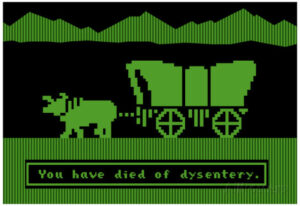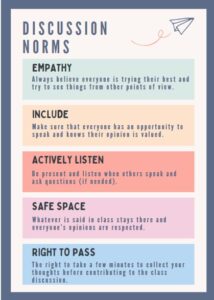
Goldilocks and the “Just Right” Technotopia
Techno-optimist, realist, or neo-Luddite? As an Xennial, I often struggle to find my place on the spectrum of tech adoption or resistance. I’m old enough to remember the joy of receiving a Nintendo at Christmas, travelling (and dying) on the Oregon Trail in school, and my life before it was purchased by social media. Yet somehow, I’m young enough to be the one my family and Gen Z students turn to when tech goes awry…all too often.

Sorry, you didn’t make it! Photo credit: Mygeekwisdom.com
The class discussion and assorted readings/videos left me wondering (yet again) where I fall on the techno-spectrum. Do I believe technology can connect us… save us? Will AI advance our thinking and creativity tenfold? Will the Metaverse virtually connect us? Or should I run for the hills and live off the land, my tinfoil hat firmly in place? (I’d be lying if I said the thought has never tempted me after reading one too many social media comment sections). Is there a middle ground that doesn’t involve me throwing my phone in the river, or fully submitting to Zuckerberg and Musk’s digital (white-male saviour) vision?

Fight of the Tech Giants. Photo credit: The Wall Street Journal
It seemed best to examine my options before deciding…
Techno-Optimism: A Futuristic Utopia?
WIFI, Chromecast, 1:1 Chromebooks, 3D printers, SaskCode, Mathletics, Blooket, Pear Deck, Google Workspace, and AI… just to name a few. What’s the common thread? They’re the classroom technologies that make my job more interactive and enjoyable. Just as my past teachers once depended on wheeling in Bill Nye on “off” days, I often feel reliant on technology to help me do my job.
Exploring the Teaching with AI website, I probably overstayed my welcome on OpenAI. The site states that teachers can use ChatGPT to role play, build content and assessment, aid EAL students, and promote critical thinking. While I would never accept the generated content verbatim, using the prompts to develop a myriad of potential classroom lessons (ones I can conceptualize but often don’t know how to actualize), proved the perfect sounding board for human creativity.
“We believe our research will eventually lead to artificial general intelligence, a system that can solve human-level problems.” – OpenAI
Meta doubles down on the techno-utopia ideal in the YouTube series, “Are We There Yet?” with the oh-so-charming Keke Palmer.
Based on the series, Meta envisions the technological future as:
- Immersive and life-like
- Collaborative and productive
- Connected, regardless of physical space
- Educational in all fields
- Environmentally friendly
- Entertaining and personalized
- An innovation hub

“Are We There Yet?” Photo credit: Meta YouTube
And it almost seems like a utopia. Almost. But, of course, my mind started ruminating on all the conveniently forgotten concerns: Digital privacy, addiction, escapism, legalities, ethics, commercialization, and accessibility inequalities…to name a few. With my growing list of concerns, I knew I couldn’t stay in this techno-utopian world.
In contrast…
Neo-Luddism: A Techno-Dystopia
On Friday night, I – shamelessly – fell down a Luddite rabbit hole learning about Ned Ludd and the 19th-century textile workers who resisted the technological encroachment of the Industrial Revolution.
My exciting, middle-aged weekend aside, it served as a historically thought-provoking perfect backdrop for Neil Postman‘s 5 key things (1998) we must understand about technological change:
- Advancements carry a price
- The digital divide assigns winners and losers (an unfortunate truth I learned teaching online for two and half years)
- Further creating prejudice and bias
- Affecting everything and everyone
- And establishes its own omnipotent mythos. (Based on the results of my recent student Google form survey, I can sadly attest that an overwhelming majority of my students spend after school online, and, unfortunately, seem disconnected from a separate potential reality).
As observed by several classmates, week one’s readings seemed to validate Postman’s often dire techno-dystopian views. From online “roasting” to an increase in online sextortion of young males, technology can take a heavy toll, particularly on our youth. In my 14 years as an educator, I have watched this burden increase for my students. When a minor’s already fragile self-image is being shredded by #roastme on YouTube, or the developing sexuality of our youth is being targeted by predators, it’s difficult not to firmly encamp myself on team techno-pessimist.

In the Matrix? GIFS credit: Tenor
But do I believe technological resistance is the answer? No. Not entirely anyway. We can’t improve what we refuse to face. What’s an anxious Xennial to do?
Techno-Realism: Between the “Topias”
After waffling between technological utopias and dystopias, optimism and pessimism, too much and too little, listening to American sociologist, Sherry Turkle, proved “just right.” In her Ted Talk, “Connected, but Alone,” her message of digital progress coupled with insightful caution struck a perfect cord. Turkle notes the dangers of overreliance on technology, including loneliness despite the promise of digital connection, being “alone together” (physically together, but mentally elsewhere), a fear of real and uncurated conversation (a growing concern I have for my students), faltering empathetic skills, the “Goldilocks Effect,” distraction (from being present in those unstructured moments), and digital sharing as a form of existence.
“Across the generations, I can see that people can’t get enough of each other, if and only if they can keep each other at a distance, in amounts they can control. I call it the Goldilocks effect: Not too close, not too far, just right.” – Turkle (2012)
Despite the dystopian undertones of her digital concerns, Turkle tempers her message with a call to action; a “time to talk.” Like Turkle, I believe we still have agency to define our relationship with technology; how and when we engage with and disengage from it. To be aware of technology, ourselves, and others seems like the brightest path forward.
Final Thoughts: A Digital Goldilocks
As Alec’s slides on Tuesday night proved, historically there have always been technological advocates and doomsayers. I hope to carve my path somewhere between the two, a digital Goldilocks on the spectrum of “just right” amounts of personal connection and innovative tech use in the classroom (and my life).
Last week, I co-created “discussion norms” with my students to foster personal connection. The same day, I taught them to use Tinkercad. The skills are not mutually exclusive. While I don’t believe in “topias” – utopian or dystopian – I do believe in educating ourselves and our students so we can co-create a blend of digital and personal wisdom in this world. It will never be a perfect endeavor, but it will always be worth it.
POINTS TO PONDER
I would love for you to share your thoughts on the following…or any other ideas/reflections that came up for you while reading:
- How do you believe your age and education have played a role in your adoption (or resistance) of technology?
- Where do you believe you fall on the techno-spectrum? Optimist, pessimist, or realist?
- How do you balance technology and personal connection in the classroom? In your own life?
Thank you for reading and for sharing your perspective!

Hi Kim. Thank you for your thought provoking post and offer to contribute my own thoughts. From my perspective, when it comes to self-reflection, I feel that I am a techo-realist: Tech has its limits and we define these limits for self. My attitude of accepting tech for what it is – a tool – prepares me to validate its use in my classroom. Postman’s thoughts on technology change made me reflect on my position of good/bad or advantaged/disadvantaged is not just because of my generational perspective toward tech change, but more about navigating the connections between tech to life space. My high school classes start with stories, to give perspective to content studied. I make connections with my students, that I hope let them see that changes, including computer technology, can be used to make sense of our/their world. Giving students the space to learn and work with digital and media literacy skills opens up conversations on norms of technology use. Thank you for this conversation!
Hi Ramona, thank you for sharing. You are so right – it really begins with conversations (as Turkle notes as well). Technology isn’t going anyway, so we should be having open conversations with our students, families, and ourselves about how we can use these tools in a meaningful, balanced way.
Really well written post, Kim. I appreciate your insight on the anxiety you feel identifying yourself somewhere on this “tech spectrum” as it were. I too feel the same way. I especially appreciate you bringing up the idea of loneliness and how technology is intertwined with what feels like an ever-increasing sense of isolation society is experiencing. I think it’s important to see technology as more of a symptom of a greater issue rather than the cause of that feeling of loneliness. I read an impactful article from the Washington Post last year (https://www.washingtonpost.com/opinions/2022/11/23/americans-alone-thanksgiving-friends/) that described this “epidemic” of loneliness sweeping the world. Again, these ideas are rife with contradictions. We are most alone at a time when theoretically we should be most “connected” via technology.
Hi Cole, thanks for sharing that great op-ed. It is certainly an epidemic of loneliness. What I find interesting is that tech giants like Zuckerberg believe the Metaverse will cure our isolation and connect us all. I have deep reservations about that – it will definitely be interesting to see how the next 10 years pan out. In the meantime, all we can do is educate ourselves, our students, and our families on how to form meaningful connections and use technology more mindfully. Thanks for sharing!
I think that some of my resistance to technology comes from the era that I grew up in. When I was in high school the web was very young (remember when websites suggested which browser and resolution that they were best viewed in?) and a lot of standards had not been set. It required a lot of expertise and knowledge to gain access to those worlds (and a whole lot of money for expensive hardware). This led to a lot of gatekeeping in technology communities and many interested individuals, myself included, were left on the periphery. It probably didn’t help that showing an interest in technology back then meant becoming a social pariah. In a way I am envious that some of the barriers are slowly coming down – interfaces are intuitive, schools are interested in STEM and STEAM initiatives, and developers have realized that getting a broad audience excited about coding is good thing. Granted that the digital divide is still preventing many from participating (and I am not claiming that students are “digital natives”), but I can’t help but wonder if my attitude towards tech would be less guarded and suspicious had I grown up in the current era, rather than in the 90s.
Thanks for the thoughtful response, Matt. Growing up in the 90’s – on the cusp of so much technology – certainly was a time to be alive! I think I only understand how transformative it was (and how it shaped me as a tech user and educator) in retrospect. It’s interesting, too, how frequently things that make people “social pariahs” eventually become the norm (as you said). When I started teaching, I had my hand slapped so many times for focusing on SEL with students. Now it is the “norm: and mental wellness goals are mandated by the government. It makes me question what else will become the norm in education before we retire.
Hi Kim,
I laughed out loud after reading about how you became the tech wiz at your school just because of your age because this is something that has always happened to me. Currently, I work at a post-secondary institution in Regina with its IT department located in Saskatoon. Therefore, any time there is an IT issue, the campus staff come knocking on my door to help them figure it out. Do I know how to fix it? Sometimes, but that is often thanks to Google. So, you asked how age and education played a role in adopting technology. Well, from my personal experience, younger professionals are often looked at for guidance when it comes to technology. We are expected to understand old and new emerging technology, in all fields. However, I can already feel a shift happening and the grey hairs setting in. In a previous tech-based course I took last semester, a gen Z student mentioned that they can tell a millennial from a gen Z just by identifying if they use PowerPoint or Canva. To maintain my youth appearance, I switched to Canva, but I assume that more changes will happen as the years progress and I will eventually become like the older generation that I work with that has to go door-knocking for tech assistance.
Haha Chantal, I completely relate to everything you say here (along with Kim’s great post). Being relied upon to fix tech issues, like you said, is more a matter of knowing what to search on google to get the answer we need – a skill that is not innate and something we have been blessed/cursed with in having to transfer our post-secondary research skills for every day life research. I also took a sip from the fountain of youth and use Canva, but I am sure there are other things I do that give my age away, like having my teaching resource half in binders and half as digital copies. I flip flop all the time between being tech reliant and tech resistant or somewhere in between.
Hi Jacquie,
I’m glad we can all commiserate together on our attempts to stay current with tech (and the clues that clearly give us away). I think it’s totally okay (and probably wise) to flip-flop between digital and paper copies. I don’t know if you were one of the unfortunate Regina educators who suffered due to the data breach last year – but I know many of my Regina classmates heavily relied on (and were super grateful for) the paper copies they still had. As I said in this blog, I think walking a middle road with tech suits me just fine. Thanks for sharing!
Thanks for sharing, Chantal. Yes, it’s always shocking how we are thrust into these roles simply based on generational stereotypes (and for having shown some interest). Your comment made ME laugh out loud – when in doubt, I, too, will walk away from helping to quickly Google something for colleagues. It makes me question, though, the learned helplessness in others regarding tech. If I could Google it, that means they could have easily helped themselves. How much do we not know, and how much do we just not want to try?